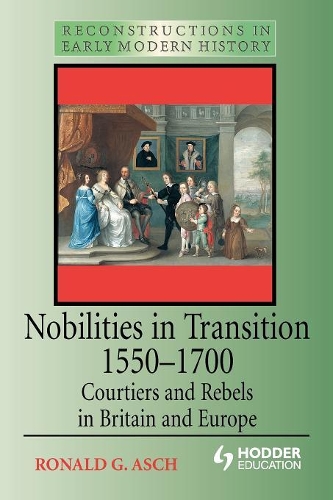
Nobilities in Transition 1550-1700: Courtiers and Rebels in Britain and Europe
(Paperback)
Publishing Details
Nobilities in Transition 1550-1700: Courtiers and Rebels in Britain and Europe
By (Author) Ronald Asch
Bloomsbury Publishing PLC
Hodder Arnold
11th September 2003
United Kingdom
Classifications
Tertiary Education
Non Fiction
Politics and government
Social and cultural history
940.21
Physical Properties
Paperback
288
Width 157mm, Height 234mm, Spine 11mm
Description
This book explores the transformation of the nobility in the late 16th and the 17th centuries. Challenges abounded, such as the new codes of conduct and social discipline which the confessional churches tried to impose, and also the ideals of urbanity and civility propagated by humanists and their 17th-century successors but nobles were in the long run largely able to assimilate such cultural trends, and subordinate them to their own value system. Few monarchs were able to rule for more than a limited period without the co-operation of significant sections of the traditional noble elite. This book looks at political and social changes, examines the impact princely courts had on noblemen and women and their way of life and analyses issues such as the 'refeudalisation' of state and society in southern Europe or the increasing urbanisation of noble elites in the period under discussion. While paying due attention to the great heterogeneity of the nobility in Europe it nevertheless shows how the adherence to common values and ideals nevertheless gave noble elites coherence and a shared sense of identity.
Reviews
Asch constructs his survey from a staggering array of secondary sources and is quick to point out exceptions to his general assertations The interesting snippets about nobles in countries off the beaten track makes this work a worthwhile read, and his discussion of the change in nobility from flamboyant display to self-control is persuasive. H-Net: Humanities and Social Science Reviews OnLin The picture that finally emerges..is one in which the culture of European nobilities was undoubtedly transformed in the early modern era. This involved some sacrfices, although the abandonment of military retinues and clientage formed a part of a process of adaptation, rather than the final decline of an effete and dying social elite, obsessed with privelege, as so often portrayed in the past. Volume 35 Issue 1 European History Quarterly
Author Bio
Ronald G. Asch is Professor of History, Universitat Freiburg, Germany
